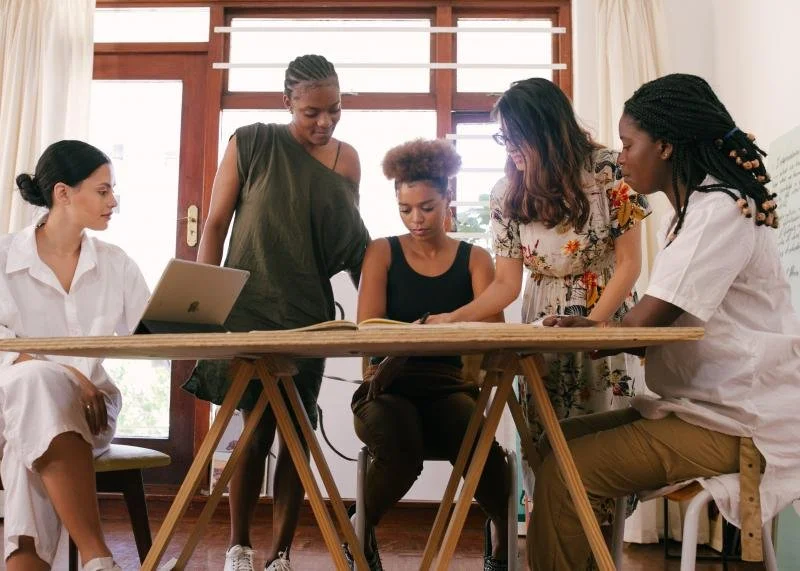Connectedness
Connectedness - or relatedness - is the need to have and develop a warm,
close bond with others.
“I often do not know how to make contact with fellow students when I want to do an activity together.”
Connectedness is the need to have and develop a warm, close bond to others. You experience relatedness when you feel like you mean something to someone, or belong to a group (for instance your family, a student society or group of friends).
You can feel related thanks to everyday things, such as a good chat or sending and receiving messages, but relatedness also concerns larger issues, like taking care of a sick parent or contributing positively to tackling climate change.
Just like autonomy and competence, connectedness – which is also known as bonding – is a universal basic psychological need. Knowing you can always address or find solace in people in your close surroundings, even during hard times, is essential.
+ When this need is met, you experience a warm, intimate bond with others. You feel that you are taken care of and are able to take care of others.
+ The more this need is met, the more you feel comfortable in your own skin, and the more you can flexibly adapt to changing life situations.
+ Students who feel related to their college or university and maintain a good relationship with tutors and fellow students are half as likely to develop emotional problems. Usually, they also perform better academically.
- When this need is frustrated, you rather feel lonely and isolated, which can lead to emotional troubles.
The power of contectedness
The ingredients of connectedness
Connectedness is composed of a mix of two ingredients: positive relationships¹ and solidarity².
Relatedness refers to the ability to build and maintain positive relationships with others. These include friendships, romantic relationships, and bonds with your parents, fellow students and flatmates. They are relationships in which you can call on each other when needed: you can rely on the other, and they can rely on you. Positive relationships consist of trust, empathy and intimacy.
The main characteristic of a positive relationship is the support you are able to give others - within the limits of your own possibilities - while being supported yourself, for instance by protecting others or making sure they feel better. This can be hidden in little things, like cooking your friend a good meal or letting a fellow student borrow your notes.
Not the quantity, but the quality is essential. In other words, the extent to which you feel connected to others is more important than the number of relationships or contacts you have.
Positive relationships¹
Relatedness also concerns engagement in your community or neighbourhood. Through this commitment you find meaning and experience a sense of belonging and unity with others.
You can feel connected to a group in which you feel ‘at home’ like your youth movement, flatmates, college/university, friends from secondary school, etc., but also to a larger culture or particular subculture such as the LGBTQI+ movement, a political party, a religion or a climate protest.
It has been proven that those who are committed to others (for instance through volunteering) experience more positive feelings like happiness, joy and pride.
Solidarity²
“I did not know anybody beforehand, but making friends turned out to be easier than I had expected. Fellow students soon share the same interests, which ensures a ‘click’. On the introduction day, I immediately found connection with a small group.”
Introduction days or freshers' week are nice moments to get to know fellow students.
Go to class a little earlier or linger around a bit longer. Even in online classes this is possible. Be open to sharing your notes and cooperate constructively in preparing group assignments.
Join the WhatsApp or Facebook group of your team or year group
Volunteer as a mentor to freshers.
Peer and buddy systems can show you the ropes of student life.
Student representatives (in Dutch: ‘studentenvertegenwoordigers’ or ‘stuvers’) can be a good sounding board.
Join a student society. This is a society founded by and intended for students, stimulating contacts among students themselves, as well as between students and ex-students. They can also inspire you around studying and exams.
Take a look at student sport societies and student societies based on certain themes, such as mental well-being.
Not fond of societies? Higher education also offers a great range of culture, sports and leisure activities where you can expand your social network.
Colleges or universities sometimes organise evening gatherings or workshops on particular themes / directed towards specific target groups
Get to know fellow students via specifically developed apps
Tips to make contact and attract friends
Go out and pluck up the courage to make contact with others. Consciously seek out places where you are able to meet new people or start a conversation with a stranger.
Maybe you can revive relationships that seem to have fizzled out. Send a message, pick up your phone or make arrangements to get together for a weekly activity.
Send someone a positive message or compliment, e.g. a friend, family member or fellow student. Show your gratitude. The recipient will feel appreciated and maybe even positively surprised or touched. Got a compliment yourself? Don't be too shy to accept it.
Volunteer or help others out. By not only receiving, but also giving support, you expand your solidarity. This can help you feel more involved with other people and society.
Tips to enhance connectedness and solidarity
Do you find it hard to make contact with others? Are you in need of a listening, sympathetic ear? Feel free to make an appointment with the student counselling services of your educational institution. They will listen to you and help you find the right solution.
In need of a listening ear?






